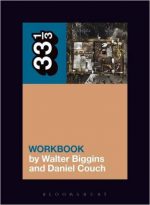Anthony Powell once said some to the effect that it’s not necessarily important that a writer lead a spectacularly interesting life, but that he should rather cultivate interesting friends. I’m certainly working on achieving this, though I’ve so far got little to show for my “efforts.” My friend Brian Winter, who I’ve known since I was four years old, is a writer who has managed to do both things.
He was an odd kid—but, then, so was I. We played Lego with each other over the phone, constructing elaborate spaceships and castles without actually seeing each other’s work because we were, you know, on the phone. Brian’s early childhood hero was local TV meteorologist Troy Duncan. Other kids wanted to grow up to be astronauts; Brian wanted to be a weatherman, and he threw himself into recognizing cloud patterns and changes in barometric pressure. This desire would graduate into a love of journalism by the time he reached sixth grade.
His attention to detail and ability for recall were both uncanny. My mom once drove him home from some Saturday function—birthday party at Penny Whistle Park, a trip to the arcade, who knows?—but forgot the directions to his house. We were heading toward the Dallas Mixmaster’s convergence of four interstates, so we needed to figure out where we were going, and fast. Brian calmly gave us clear directions—which interstate to take, what lane we’d need to be in, what direction we’d be heading after that, what exit we needed to take, what notable landmarks would be visible if we took a wrong turn—across Dallas. Mom initially scoffed at the kid but it became increasingly clear that he was leading us home. Giving crosstown directions in big-city traffic is often hairy for adults. Brian was eight at the time.
Upon graduating from the University of Texas in 1999, he essentially decided to re-invent himself, and moved to Buenos Aires on a whim. He lived in Argentina from 2000 to 2004. These years, unfortunately for him but terrific news for his readers, coincided with the country’s worst economic collapse ever. After months of unemployment and “what-the-fuck-am-I-doing-here?” moments, he got a job as a Reuters correspondent, writing the occasional dispatch from Argentina to the rest of the world. He saw riots, a national currency in freefall, citizens climbing over themselves to get out of the country, and the grassy plains of the Pampas. He paid attention. As his Spanish improved, he noticed and memorized different accents, ways of dress and talk, and grew fluent in the ever-present politics that dominated conversation from the nightclub to the cab ride home.
He also learned to tango.
His new book, Long After Midnight at the Niño Bien: A Yanqui’s Missteps in Argentina, captures a country in chaos while also charting the author’s growing pains. Using tango (the dance and its music) as a lens through which to view Argentina, Brian fuses memoir, journalism, history, and cultural commentary to create a compelling, funny work about a beautiful nation in turmoil. His breezy, funny prose belies a sharp bite. He asks hard questions—of Argentina, and of his status as an American tourist—but does so in a hilarious way that shows off a well-tuned ear for dialogue and a clear eye for the telling detail and anecdote.
I’m not sure if it’s travel literature but, as master travel writer Pico Iyer points out, the genre is one that blurs distinctions from the outset:
…[T]ravel writing always dances on the boundaries between fiction and nonfiction. I remember Paul Theroux brought out a selection of stories a few years ago and when they appeared in the New Yorker, they were literally characterized as “Fact and Fiction.” Bruce Chatwin’s stories always are flickering on the edge, and it is hard to tell what is invention and what recreation. And I remember V.S. Naipaul brought out a book a few years ago called The Way in the World, and the same text came out on one side of the Atlantic as nonfiction and on the other as fiction. So in some ways I think the distinctions are as arbitrary in travel writing as anywhere else. But clearly the allure of travel writing for many people is that they can throw fiction and nonfiction and everything in between into their narratives.
Long After Midnight is a remarkable addition to contemporary travel literature, and I’m not just saying so because its author is an old friend. Publishers Weekly calls the book an “outrageously funny tale of dance steps and travel,” and Kirkus describes it an “an elegant, caustic travelogue sparkling with insight.” I’m proud enough of him to offer, in the spirit of adventure, an experiment to my faithful readers.
Quiet Bubble is devoting the week of April 7-11 to Brian’s Long After Midnight at the Niño Bien. There will be a full review, a couple of excerpts from the book, and an interview with the author, the latter of which will be a first for this blog. Stay tuned.


Hi there. I am reading Brian’s book right now and as a fellow Yanqui (previously married to a Porteno) I am fully enjoying it. I was pleasantly surprised at the subtleties he picked up on Argentine life. It is a great place because of the people.
Besos,
Monica